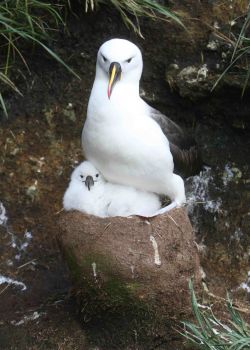Vincent Bourret (CEFE, CNRS-Université de Montpellier, France) and colleagues have published open access in the journal Conservation Letters on a novel procedure to reduce the effects of disease on globally Endangered Indian Yellow-nosed Albatrosses Thalassarche carteri on France’s Amsterdam Island.
The paper’s abstract follows:
“Global change is contributing to unprecedented expansions of infectious diseases in wildlife. Recurrent avian cholera outbreaks are causing dramatic chick mortality and population decline in endangered albatross colonies on Amsterdam Island, a critical seabird breeding ground in the Southern Indian Ocean.We manufactured a killed vaccine using a Pasteurella multocida strain isolated from a dead albatross in the field. We used this same bacterial strain to establish a serological assay allowing the monitoring of antibody levels following bird vaccination. Using this vaccine on chicks 2 weeks posthatching caused 100% seroconversion and reduced the death risk by a factor exceeding 2.5, raising fledging probability from 14% to 46%. These results suggest that using a specifically tailored vaccine could be a key tool to effectively protect endangered seabirds from disease outbreaks threatening them with extinction.”

An Indian Yellow-nosed Albatross broods its downy chick, photograph by Peter Ryan
With thanks to Barry Baker.
Reference:
Bourret, V., Gamble, A., Tornos, J., Jaeger, A., Delord, K., Barbraud, C., Tortosa, P., Kada, S., Thiebot, J.-B., Thibault, E., Gantelet, H., Weimerskirch, H., Garnier, R. & Boulinier, T. 2018. Vaccination protects endangered albatross chicks against avian cholera. Conservation Letters DOI: 10.1111/conl.12443.
John Cooper, ACAP Information Officer, 23 February 2018

 English
English  Français
Français  Español
Español